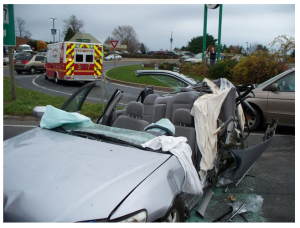It’s not an accident, it’s a collision
 Do a search for auto accident lawyers, and you’ll find a ton of us—really, it’s like law schools were designed to pump out personal injury lawyers with the speed of widget-making machine. Most of them have one thing in common—something that has always bugged me. They call it an automobile “accident.” I’m guilty of it—it’s hard to avoid that alliterative phrase.
Do a search for auto accident lawyers, and you’ll find a ton of us—really, it’s like law schools were designed to pump out personal injury lawyers with the speed of widget-making machine. Most of them have one thing in common—something that has always bugged me. They call it an automobile “accident.” I’m guilty of it—it’s hard to avoid that alliterative phrase.
Here’s the thing: the word accident somehow makes it sound forgivable. In the religious or moral sense, that’s fine. But in the legal sense, just because someone hurts someone else because of a mistake, it doesn’t absolve them of having to make up for it. Sometimes we all fall back on the accident jargon, but better word is, simply, collision. The flip side of the “accident” coin is a phrase that I do like: personal responsibility.
If I do something wrong, I have to make up for it. That’s how I was raised. That’s how I try to raise my three kids. That’s how we should all act. Insurance makes this easy—if I cause a collision, I pay insurance so my insurance company can help those people that I hurt. It might affect me a bit—a modest increase in my insurance premiums. However, it makes me feel much better to know that, whatever injury I caused, I can somehow remedy the situation, through my insurance company.
Sadly, some people don’t think this. I understand how it happens with some people. You’re involved in a collision, and none of us wants to think that we did something wrong. We also have this gut reaction—we want to stay out of trouble. The problem is, if we don’t admit what we did right away, if we lie about it even for a minute, it is exponentially harder to tell the truth. Hard to admit that we caused a collision, and even harder to admit that we lied about it. So we double-down, and stick to that lie.
One more thing on the “accident” terminology. Accidents are avoidable. They happen because we are inattentive, because we act beyond our capabilities, because we disobey the rules of the road. That’s why we must take responsibility for our accidents—if you caused it, you have to fix it.
 Maryland Car Accident Lawyer Blog
Maryland Car Accident Lawyer Blog

